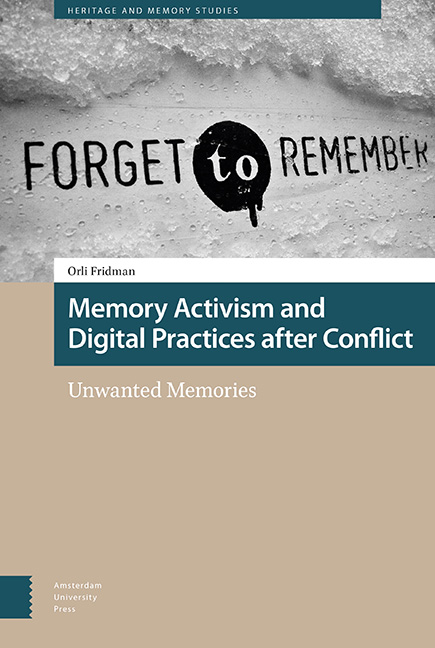Book contents
- Frontmatter
- Table of Contents
- List of Figures
- Preface
- Acknowledgements
- Introduction: Memory Activism and Alternative Commemorative Practices after Conflict
- 1 Unwanted Memories of (the Wars of) the 1990s
- 2 ‘Not in My Name’: From Anti-War to Memory Activism: The First Generation
- 3 ‘Too Young to Remember, Determined Never to Forget’: The Second Generation
- 4 Hashtag Memory Activism: Digital Memory Practices and Online Commemorations
- 5 Regions of Memory: The Post-Yugoslav Space as a Region of Memory Activism
- Epilogue: Unwanted Pasts in an Unresolved Present
- Appendices
- Bibliography
- Index
3 - ‘Too Young to Remember, Determined Never to Forget’: The Second Generation
Published online by Cambridge University Press: 07 October 2022
- Frontmatter
- Table of Contents
- List of Figures
- Preface
- Acknowledgements
- Introduction: Memory Activism and Alternative Commemorative Practices after Conflict
- 1 Unwanted Memories of (the Wars of) the 1990s
- 2 ‘Not in My Name’: From Anti-War to Memory Activism: The First Generation
- 3 ‘Too Young to Remember, Determined Never to Forget’: The Second Generation
- 4 Hashtag Memory Activism: Digital Memory Practices and Online Commemorations
- 5 Regions of Memory: The Post-Yugoslav Space as a Region of Memory Activism
- Epilogue: Unwanted Pasts in an Unresolved Present
- Appendices
- Bibliography
- Index
Summary
Abstract
This chapter discusses the work of younger memory activists in Belgrade, which I refer to as the second generation, and the ways this generation articulates their mnemonic claims and practices concerning Serbia's recent difficult past. It also examines processes of continuity and change in memory activism in Serbia, from variations on the way activists express their mnemonic claims, to innovations in mnemonic practices unveiled alongside the continuation of already established commemorative rituals. Memory activism addressing the war in Kosovo is also explored in this chapter, as well as additional memory work related to the mass graves in Batajnica. The chapter ends by capturing acts of resistance to the glorification of war crimes and war criminals, and memory activism as protest.
Keywords: second generation, memory activism, mnemonic practices, war crimes, protest, unwanted memory
It was August 2016 when a number of high-profile politicians in Serbia announced their intention to erect a monument in memory of Slobodan Milošević, the former head of state who died in his prison cell in 2006, in the midst of his trial at the International Criminal Tribunal for the former Yugoslavia (ICTY). Their announcement came as claims circulated in Serbia regarding the ICTY verdict convicting former Bosnian Serb political leader Radovan Karadžić, which some interpreted as having acquitted Milošević of guilt for genocide and crimes against humanity in Bosnia and Herzegovina. A statement from an official in Milošević's former party, the Serbian Socialist Party (SPS), read: ‘We all knew that Milošević was not guilty. He should get a street [named after him] and a monument in Belgrade’ (Dragojlo 2016). Another high-ranking politician remarked that, ‘when such a tribunal recognizes that Milošević did not participate in an organised criminal enterprise, it is clear that Serbia was right’ (Dragojlo 2016).
This rehabilitation of Milošević was followed by reactions in Serbian media and on social media, with some hailing the idea of a monument and others strongly critical of it. Among the harshest criticisms was the suggestion that sitting politicians were attempting to whitewash their own biographies (as they themselves had been active in the Serbian political arena in the 1990s and were in Milošević's party or government) and even seeking to erect a monument to themselves (Štetin Lakić 2016; Rašuo 2016).
- Type
- Chapter
- Information
- Memory Activism and Digital Practices after ConflictUnwanted Memories, pp. 97 - 130Publisher: Amsterdam University PressPrint publication year: 2022

